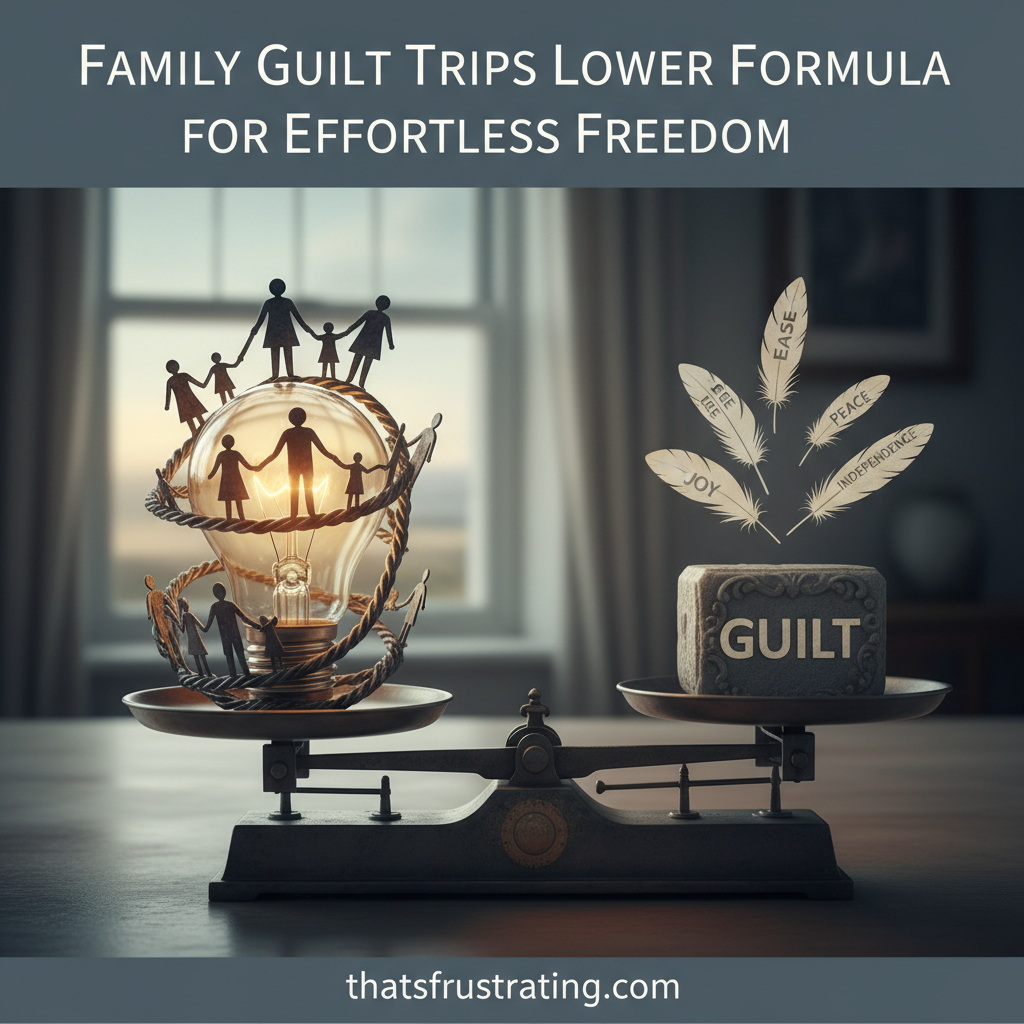Family gatherings are supposed to be joyous occasions filled with laughter and love. Yet, for many, family events can stir up feelings of guilt and frustration. Whether it’s a relative’s passive-aggressive remark or the expectations you’re pressured to meet, navigating family dynamics isn’t always a cakewalk. Let’s explore how you can tackle this emotional turmoil using the LOWER method: Label, Own, Wait, Explore, and Resolve.
Understanding Emotional Frustration in Family Dynamics
Family gatherings often uncover complex emotions, and it’s important to address and manage these feelings effectively. It’s easy to feel overwhelmed, but with a mindful approach, you can find emotional freedom and maintain your well-being.
Label: Recognizing the Frustration
It’s crucial to label your emotions effectively. That’s frustrating when you find yourself caught in a web of expectations and unspoken family rules. Maybe it’s the pressure to behave a certain way or constant comparisons with siblings. Identifying the sources of frustration is the first step toward managing them.
When faced with these situations, label your feelings honestly. Acknowledge how draining and overwhelming this guilt trip can be.
Own: Taking Responsibility for Your Feelings
Transitioning from understanding your frustration to owning your feelings can empower you. I feel frustrated when my family’s lingering criticism affects my peace of mind. Embrace these emotions without judging yourself. It’s natural to feel frustrated, especially when you’re trying to satisfy everyone else at the cost of your own happiness.
By owning these feelings, you’re not letting them control you. Instead, you’re acknowledging their presence and giving yourself permission to address them.
Wait: Cultivating Patience and Pausing
Once you’ve labeled and owned your feelings, it’s time to breathe. Waiting doesn’t mean avoiding; it means giving yourself space to process. In moments of family-induced frustration, a brief pause can prevent escalation. Take a deep breath, remind yourself it’s okay to feel this way, and reflect before responding.
Explore: Navigating Solutions and Embracing Change
Once you’ve given yourself time to pause, exploring solutions becomes vital. Here are four suggestions that can pave the way toward emotional freedom:
- Communicate Assertively: Open and honest communication can defuse tension. Instead of bottling up emotions, express concerns assertively and respectfully to your family members. Use “I” statements to keep your perspective at the forefront without sounding accusatory.
- Set Boundaries: Understand that your time and energy are precious. Setting boundaries is crucial when family guilt trips arise. Don’t be afraid to say no. By defining your limits, you maintain control over your emotional and mental well-being.
- Seek Support: Sometimes, talking things over with someone outside the family can provide clarity. Whether it’s a close friend or a therapist, external perspectives can equip you with strategies to cope with frustration.
- Practice Mindfulness: Engage in mindfulness techniques like meditation or journaling. They can help center your thoughts and reduce stress. Practicing self-care in this way not only boosts your patience but also empowers you emotionally.
Resolve: Finding Closure and Gaining Freedom
Resolution comes from addressing these emotional challenges with understanding. Implement what you’ve explored, and close the chapter with peace in your heart. The courage to express, set boundaries, seek help, and practice mindfulness will reinforce your emotional resilience.
Family won’t always understand your choices, and that’s okay. Remember, the goal is to free yourself from the guilt traps without severing valuable connections.
FAQs
1. How do I handle feeling guilty when setting boundaries with family?
Setting boundaries can initially feel uncomfortable, but they are essential for your well-being. Clearly communicate your needs and express that boundaries help maintain a healthy relationship, ultimately benefiting everyone.
2. Is it selfish to prioritize my emotions over my family’s expectations?
Prioritizing your emotions isn’t selfish; it’s necessary for your mental health. By being true to yourself, you often improve the quality of your interactions with others, including family.
3. How should I respond to passive-aggressive comments from family members?
Respond with calmness and confidence. Acknowledge their comment and express how it affects you, if necessary. Staying composed can sometimes diffuse the situation better than pushing back.
4. What if my family doesn’t respect my boundaries?
If your family consistently ignores your boundaries, reiterate their importance calmly. Seek support from a counselor to navigate these challenges and consider the long-term effects on your relationships.
Closing Thoughts: Freedom Through Emotional Awareness
Family guilt trips are an emotional challenge that many face but seldom discuss. By applying the LOWER method, you can navigate these situations more effectively and reduce their impact on your emotional health.
Our partner in emotional wellness, CalmMind, provides resources that complement this journey. Their curated mindfulness sessions and communication workshops can guide you towards achieving greater peace. Try CalmMind for free today to explore the boundless potential of emotional freedom.
Family dynamics may challenge us, but with understanding and the right tools, navigating them becomes a manageable journey toward emotional fulfillment.





Leave a Reply